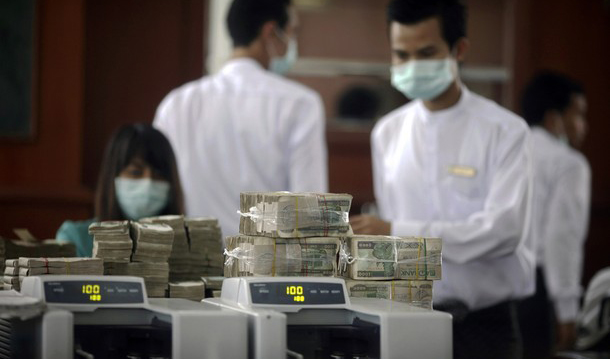RANGOON — An easing of restrictions will likely allow foreign banks to enter into joint ventures with local lenders and open branch offices in Burma, according to Khin Saw Oo, deputy governor of the Central Bank.
Responding to a report from Reuters that Burma would allow some foreign banks to start offering limited financial services next year, Khin Saw Oo confirmed the plan by the country’s banking authority.
“We’re going to allow new products for foreign banks next year, but we’re now still considering” the exact nature of the new financial services to be allowed, she told The Irrawaddy. Foreign banks will likely also be allowed to participate in equity transactions on a Rangoon stock exchange tipped to open in 2015.
According to the Central Bank’s website, there are 24 foreign banks’ representative offices in Burma, including lenders from China, Japan, South Korea, Vietnam, India, Thailand and Singapore. These firms are not yet allowed to open branches or offer services other than advising clients. Khin Saw Oo said any firm with a representative office in Burma would be granted equal opportunity to involve itself in Burma’s financial system, within the constraints laid out by the Central Bank.
Tiffany, deputy general manager of the local Kanbawza (KBZ) Bank, said that if the Central Bank allows joint ventures between local and foreign banks next year, she expected that local banks would gain technical expertise, while foreign banks would get a better grasp of the domestic market.
“I’ve heard some local banks are speaking with some foreign banks regarding joint ventures, but for KBZ Bank, nothing has been discussed with foreign banks yet,” Tiffany said.
Some local banks have expressed concern that foreign joint ventures could swallow up local lenders that opt to remain independent, but Tiffany suggested that reserving the retail banking sector to local lenders—at least for a time—would help. Retail banking refers to financial offerings to individual customers, such as personal loans and accounts, mortgages and other services provided directly to consumers, as opposed to those provided to companies or other banks.
“As the deputy governor said before, if they don’t allow for retail banking, we won’t be harmed, but we need to improve banks’ efficiency beginning now,” Tiffany said.
Amid local lenders’ concerns, International Momentary Fund chief Christine Lagarde warned the Burma government against rushing as it opens up its banking sector to international competition.
“It’s most suitable for Myanmar to use the ‘no haste, no waste’ way for opening up its banking sector,” Lagarde said over the weekend on a two-day visit to Burma, with the IMF chief pledging technical assistance from the IMF.
“Myanmar must stabilize its banking system with strong monetary policy, directed by an independent Central Bank and a bank monitoring system with the help of IMF,” Lagarde said.
A bill on financial institutions drafted by the Central Bank is expected to codify a more liberal financial sector than currently exists under a law that was passed in 1990.
According to the Central Bank, there are 19 private banks in Burma.

















